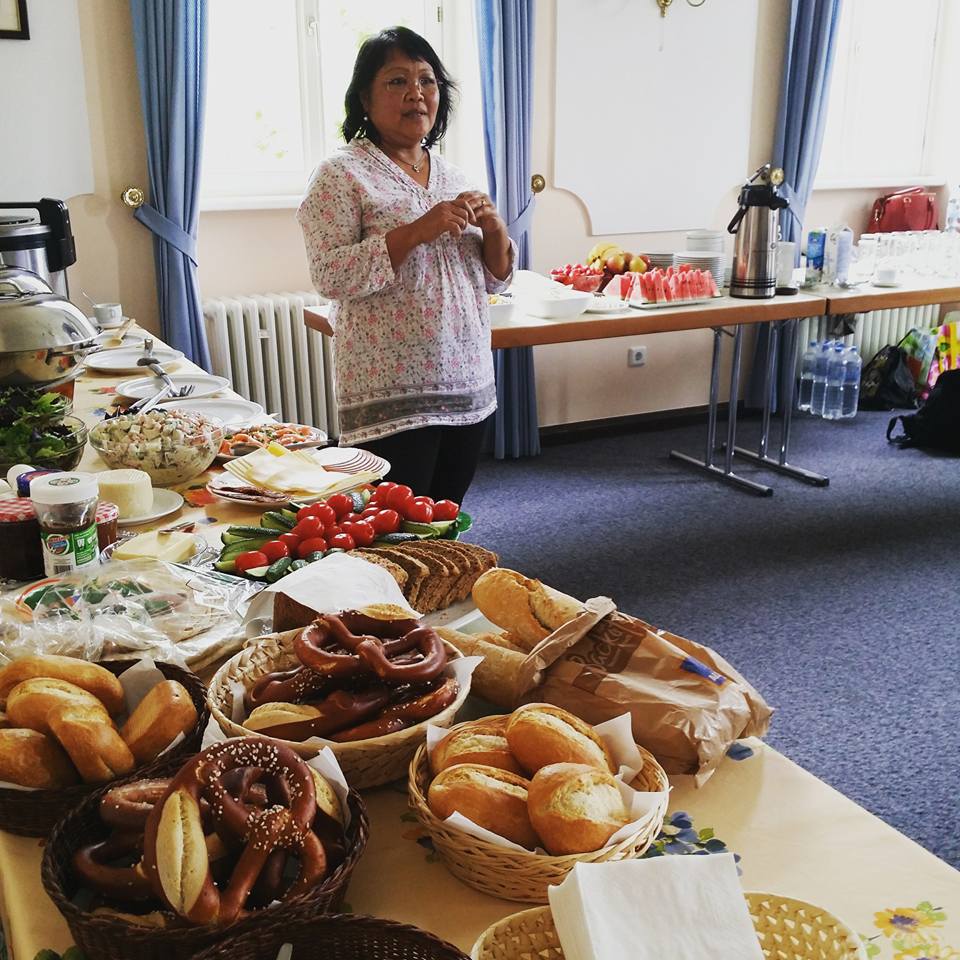Food bridges cultural divides – and there’s no time more relevant than now. I interviewed Juliah Rais-Morres – mother of two, freelance landscape architect, caterer, Malaysian-Asian cooking instructor, and founder of “Cooking for HOPE“, a project to aid refugees, specifically teenagers who arrive in Germany on their own, without their parents or families.
Juliah was the first Malaysian I met in Heidelberg when my family and I first moved there in August 2014. She made us feel at home with her Malaysian cooking, and she’s ever-helpful with handy tips as we settled down to life in the region.
Me: You have recently started a project to aid refugees, specifically teenagers who arrive in Germany on their own, without their parents or families. What inspired you to get involved?
JRM: End of last year, I was in the process of closing down my restaurant Serai, and had wanted to use my remaining stock of food items to cook free lunch buffets for refugee families with small children. However, by the time the authorities got back to me in January, it was already too late to make it happen. The thoughts of wanting to help out the refugees in anyway possible were still with me after Serai closed. I got the idea of helping teenage refugees because of my son Daniel. He loves my food and he loves to cook. When he was travelling in Asia and New Zealand for six months with his friends, I had asked myself almost everyday if he had enough food to eat…. A mother’s instinct I guess. Teenage refugees left their homes and their families without knowing when they will ever see them again. They have gone through a lot, and now they are on their own. I wanted to bring some cheer into their lives through food, and decided to make use of my cooking skills – I could teach them how to cook, and share with them European and Asian food culture. Hence the project’s name “Cooking for HOPE”, which was born in March this year.
Me: On May 28th, you successfully hosted your first cooking session with youths from Punjab, Guinea and Afghanistan. With so much on your plate – juggling a job, conducting cooking courses and running a catering business – how do you manage?
JRM: I once heard a saying that goes, “Time is free, so if you don’t have time, just take it”! I think this following quote answers your question:
Don’t let the fear of the time it will take to accomplish something stand in the way of your doing it. The time will pass anyway; we might just as well put that passing time to the best possible use” ~ Earl Nightingale
Me: Was it difficult to get to these kids? Who or which organization did you contact first?
JRM: In the beginning it was difficult because I didn’t know where to start, who to talk to. I phoned and emailed all possible avenues. My first contact was the city of Heidelberg’s “Flüchtlingsrat” – here I found out that new arrivals at Patrick-Henry-Village are taken care of by the state of Baden-Württemberg (and not the city of Heidelberg). I was directed from one person to another – this took more than two months and slowly I was losing hope that I would ever get to the youths. My luck changed when an acquaintance suggested that I should contact various “Jugendheim” (youth homes) in Heidelberg which have quite a few numbers of refugees teenagers in their facilities. I had luck with the Johannes Falkhaus (“Jugendheim” in Boxberg) – they sent eight youths to participate in the first event.
Me: How did your family and friends react to this project? Since you can’t do this alone, who are supporting you?
JRM: My husband and my kids have been very supportive –my kids especially found it very cool that I am helping out. When I told my friends, they liked the idea too, and right away volunteered to help.
Me: Ramadan, the Muslim month of fasting is coming to an end soon, and to celebrate Eid al-Fitr I understand you have something special lined up?
JRM: Many of the youths are from Muslim countries, and being away from home, they miss all the customs that accompany the month of Ramadan, including traditional foods made with motherly love. I can still recall my first Ramadan without my family – I was 18, studying in Louisiana, and I was crying so hard because I was so homesick!
Eid al-Fitr is an important festival spent with family, and since these youths can’t be with their families, I would like to treat them to special dishes, along with a home-cooked meal, which I am sure they have been missing. This is also a good opportunity for me to challenge myself to venture into Middle Eastern cuisine.
Me: Thank you Juliah for sharing your project with us. Your efforts are proof that food bridges cultural divides and brings everyone together!
To get in touch with this lady with a heart of gold, write her at: info@serai.de

